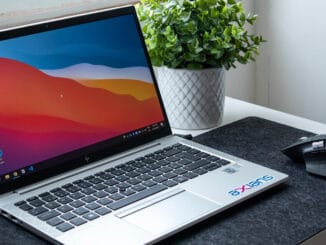In this guide, we will provide you with the information that you need to calculate the number of watts that your laptop uses. Are you planning to purchase a new laptop and want to know what the energy consumption is likely to be? You will find what you need to know here.
If you are looking for a quick approximate answer to the question “how much power does a laptop use?” then the best answer we can give you is that on average, a laptop with a 15-inch screen will consume around 50 to 60 watts per hour. This is an estimate as there are different factors that you need to consider.
Every laptop model is different and if you want an exact figure, then you need to examine the components in it. We will cover all of this later on in this guide. The good news is that laptops are not “energy hungry,” so any model that you use should be light on power consumption.
Table of Contents
What you need to consider
With new laptop models coming out all of the time, manufacturers are utilizing new technologies to minimize power consumption. They are making specific changes, which do not impair the use of the laptop but result in fewer watts consumed by the machine. The amount of power that laptops consume will definitely improve in the future.
You need to be aware that the type of laptop that you use will determine the amount of power it consumes. If you connect a lot of external hardware to your laptop, such as external hard drives, webcams, and so on, then it is going to increase the power consumption. So let’s take a look at the factors that affect power consumption with a laptop.
Workstations and gaming machines
A basic laptop for general use will consume between 50 to 60 watts each hour. If you have a high-end workstation or use a gaming laptop, then the amount of energy consumed will be significantly more than this.
Some of the higher specified workstations and gaming laptops can consume more than 100 watts per hour. These kinds of laptops generate a lot of heat and if you have one of these, we recommend that you use a stand with cooling fans to keep it cool. When you charge these types of laptops, you will consume even more power.
The type of CPU makes a difference
It will probably interest you to know that laptops with lower grade CPUs often consume more power than those that have high-grade CPUs, such as Intel i7 or i9 processors. The higher-grade processors do not need as much power to deal with the applications that you run on your laptop.
If your laptop has a lower grade CPU, then it will have to work a lot harder if you use resource-hungry applications. When you use the same applications with the higher grade CPUs, they will perform more efficiently and consume less power.
What graphics card do you have?
If your laptop has a high specification graphics card in it, then it will consume more power than a machine that does not. You may require a top-end graphics card for the best gaming experience on your laptop. High-end workstation laptops and gaming laptops almost always include high spec graphic cards that consume more power.
The graphics card in your laptop will usually have a high-performing CPU with it if it is in the high specification category. Your laptop will need a high-quality display to utilize the features of the graphics card and the battery capacity of your laptop needs to be high as well. All of this leads to increased power consumption.
How many watts does a laptop charger use?
Usually, there are two types of power adapters/chargers supplied with laptops. If your laptop has a 15-inch screen, then it is very likely that your charger will consume around 65 watts per hour when plugged in. Larger laptops that have 17-inch screens usually have a charger that consumes around 90 watts per hour when plugged in.
The message is clear here. If you want your laptop charger to consume less power each hour, then choose a laptop that has a smaller 15-inch screen. To keep a 17-inch screen going requires more power consumption.
How much power does a laptop use when plugged in?
If you are a gaming laptop user, then you will probably know that all the components are high specification. Most modern games are extremely resource hungry and you need the hardware to handle this. It is common for a gaming laptop to consume around 180 watts each hour.
Do you own a MacBook laptop or are you thinking of getting one? If this is the case, then you need to know that the MacBook Pro with a 13-inch screen will consume 61 watts per hour, while the larger 15-inch screen MacBook consumes around 87 watts each hour.
Ways to decrease your laptop power consumption
Fortunately, there are a number of things that you can do to reduce the power consumption of your laptop. You now know what features consume the most power, so use these proven ways to drive down your laptop’s power consumption:
- When your laptop is fully charged, remove the power adapter from the mains outlet
- Use your charger when your laptop battery has a charge of only 10% —do not let it fall below this level
- Be careful not to overcharge your laptop, as this can weaken your battery and this will lead to more power consumption
- If you can update hardware to relieve the pressure on your current specification, then do so
- Always let your laptop cool down for a while before using it intensely again
- Get a laptop stand with a cooling pad to keep your laptop as cool as possible
All of these things are simple to do with the exception of upgrading your hardware. A simple RAM upgrade can often make a big difference. So check out what is possible.
Calculating the power consumption of your laptop
You can calculate the power consumed by your laptop manually. The first thing to know is the wattage of your power adapter. Usually, this is printed on the brick. Other components of your laptop will increase power consumption, such as your CPU type and your graphics card GPU.
It is possible to find the average power consumption of the CPU that you have on your laptop by searching online. Check the respective websites of Intel or AMD for this information. The same goes for your graphics card. If you have an Nvidia card, for example, go to their website and check the power consumption.
You should find that a laptop CPU will consume between 45 watts and 50 watts. The video card GPU usually has a higher power consumption of around 75 watts to 80 watts. Another factor to consider is the brightness of your laptop screen. Maximum brightness usually consumes a further 15 watts each hour.
It is not likely that you will get a truly accurate figure with a manual calculation. But you can certainly use it as a guide. If the figure is around 60 watts an hour, it will only cost you around 7 cents per day if you use your laptop for 8 hours.
If you really want to be accurate, then you can use a meter that measures electricity usage. You can purchase one of these and then use it over the mains outlet to tell you the exact amount of watts that your laptop consumes.
A meter that measures electrical power consumption will start to read the power consumed by your charger once you plug it in. It is normal to find that the consumption will be close to the maximum power of the charger, for example, 60 watts per hour.
Another test that you can do is to see how much energy the components of your laptop consume on a fully charged battery. There is software available to measure this, which will give you an accurate reading.
Conclusion
You now know what factors are important in the power consumption of your laptop. Laptops do not consume much power and you can do even more to minimize this. The more power your laptop has in terms of hardware, the more watts it will tend to consume every hour.




Be the first to comment